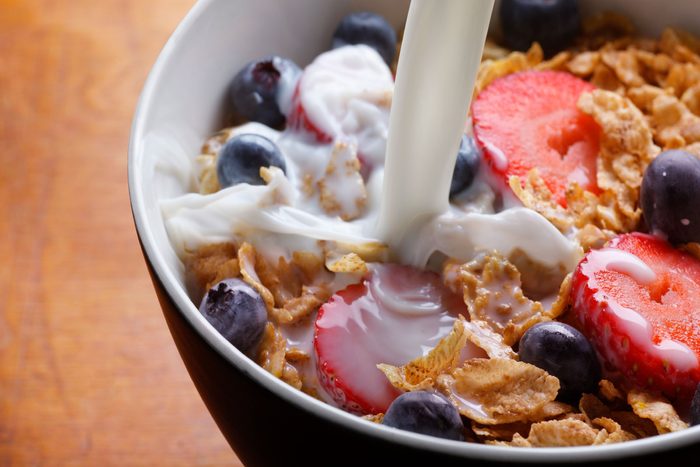
Daily habits that can slow metabolism
You may find comfort gorging on pizza and drinking a couple of glasses of wine while binge-watching your favourite TV show or movie every weekend. While you probably think satisfying these vices are fine, because you can always go back on your diet during the week, these habits can actually affect your metabolism and your weight. Your body’s metabolism rate, which is how is fast or slow you’re able to burn calories, can dictate how much weight you put on or not.
To effectively boost your metabolism, it’s important to identify the everyday habits that can actually slow down your metabolism. To do this, we spoke with health experts who break down these bad vices and offer tips for how to deal with them throughout the day.

You eat breakfast closer to brunch time
Mornings at your house may be bananas. Between getting the kids to school on time and yourself to work on time—and the 3,000 things required to make those two feats happen—you’re lucky if you can sneak in a sip of orange juice before your first meeting. But when you’re sleeping, you’re not eating, and after all those hours with no nutrients, your metabolism—the process by which your body converts food and drinks into energy—needs a little jump-start. To get your calorie-burning engine going, have breakfast within an hour of waking up—or even better, within 15 minutes, says Joanne Rinker, RDN, director of practice and content development for the American Association of Diabetes Educators in Chicago. Check out these healthy, energy-boosting breakfast recipes.

You have cereal instead of an omelette
It takes your body more time to digest protein, so eggs will keep you feeling fuller longer than if you pour yourself a bowl of carbs in the morning. Opting for the omelette (or Greek yogurt parfait or overnight oats) may also give your metabolism a little boost. To digest, absorb, transport, and store the food you eat, your body uses calories, and protein needs more energy to metabolize than fat or carbs, says Tammy Lakatos Shames, RD, certified fitness trainer and co-author of Fire Up Your Metabolism. Your best bet: Have a serving of protein with every meal.

You stopped drinking coffee
Drinking caffeinated coffee can cause a temporary—but significant—increase in metabolism, says Kristen Gradney, RDN, senior director of health centers in schools at Our Lady of the Lake Children’s Hospital in Baton Rouge, Louisiana and a state policy representative for the Louisiana Academy of Nutrition and Dietetics. The caffeine gets absorbed into the bloodstream very quickly, speeding up heart rate and providing that metabolic boost. So if you want a cuppa in the morning, and even in the afternoon, enjoy it. Three to five cups a day can be part of a healthy diet, according to the 2015-2020 Dietary Guidelines for Americans. The catch: Keep your coffee as simple as your taste buds can take. Too many added calories from sugary syrups and fatty cream can outweigh the health benefits. Here are other ways to make your coffee healthy.

And you don’t drink enough water
Every cellular process in your body relies on water, so not hydrating properly can decrease metabolism, says Gradney. And when you’re dehydrated, you have less energy to walk, bike, or do what you need to do to burn calories, adds Shames.

You won’t curl a dumbbell
And you have no interest in lifting, pressing, or pumping any other form of iron. Fine. But if you won’t touch a resistance band either, or do a push-up or squat, you’re pretty much pumping the brakes on your metabolism. Here’s why: Muscle tissue is the source of your resting metabolic rate, says Jeffrey I. Mechanick, MD, clinical professor of medicine and director of metabolic support in the division of endocrinology, diabetes, and bone disease at the Icahn School of Medicine at Mount Sinai, in New York City. This refers to the number of calories your body uses to keep your heart beating, lungs pumping, and all the other necessary functions that keep our body healthy. So it stands to reason: the more muscle you have, the higher your metabolic rate, and the more calories you burn. As we age, we lose muscle and gain fat. To counteract those sad-but-true effects, include strength training in your regimen. Here are some medical reasons you might have a slow metabolism.

Or you curl your dumbbell too fast
You get an “A” for strength training effort, but take it slow when you lower the weight for maximum metabolism-boosting benefits. Eccentric (or lowering) movements cause muscle tissue to break down more so than the act of lifting; and that’s good because your body will need to burn more calories in order to repair the damage, hence the metabolism boost. Find out what a single workout can do for your metabolism.

You’re crash dieting
Cut calories like crazy in an effort to shed pounds fast, and your body will hold on to them even tighter. It’s not being spiteful; it just thinks you’re starving, so it compensates by slowing down the rate at which you burn calories to conserve fuel. “Your body will start to do more with fewer calories, ultimately cutting down the amount of calories it uses,” says Gradney. Eating small, well-balanced meals throughout the day—every three to four hours—can keep you satisfied and your metabolism humming. Here’s how to be healthy without dieting.

You sit too much
Before you think this one doesn’t apply to you because you work out, keep reading: More than half of our waking hours are spent sitting—at your desk at work, in the car while driving, on the couch watching TV. All that sedentary behaviour was linked to significantly higher odds of heart disease, diabetes, and other serious health risks—even if you exercise regularly, according to an analysis of 47 studies published in 2015 in the Annals of Internal Medicine. When we’re sitting, our metabolism is not as functional, according to the study. But leisurely movements—like walking to your colleague’s office instead of calling—requires muscle activity that seems to trigger processes related to the breakdown of fats and sugars within the body. Even simply standing burns more calories than sitting, so every half hour, take to few minutes to at least get up. Check out the signs you need to move more.

You stay for two drinks
Your body can’t store alcohol. So, when you sip a martini, your liver focuses on metabolizing your cocktail instead of breaking down fat from the food you’ve eaten. “Excessive alcohol intake will disrupt the lipid metabolism process,” says Gradney. (Also, here’s why drinking alcohol can make you hungry.)

You stress a lot
Stress has (give or take) plenty of negative effects. It increases hormones that stimulate the appetite centre and leads to comfort eating behaviours, says Dr. Mechanick. The kinds of foods we tend to seek comfort in? More cake, and similar fat- and sugar-filled treats. (Also, learn about how to stop your nighttime stress-eating habit.

You sleep too little
Sleep loss can increase insulin resistance, resulting in high blood sugar levels; it can also mess with hormone levels that impact your metabolism. Cortisol levels rise, which is associated with fat storage, explains Shames, and growth hormone—which makes lean muscle tissue—decreases. For your body to do its job, and do it well, it needs seven to nine hours of sleep a night.
Next, learn what temperature you should sleep in to boost your metabolism.
